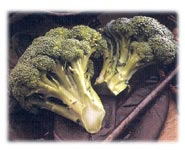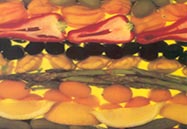|
According to WF Nutritionists,
eating across the food rainbow is vital for a healthy life - everyone should eat
something from each colour range every day. This article will help you find the
foods to choose, to boost your health.
Green:
-
 Broccoli:
Being part of the cruciferous vegetable group, it is rich in the groups of
phytochemicals called indoles, dithiolthiones, and isothiocyanates that are
associated with reduced cancer risk. It is a good source of vitamins A and C
(when raw or only slightly cooked), potassium, and fibre. Broccoli is also
rich in iron, folic acid, calcium and riboflavin. It also contains large
amounts of betacarotene, which is important antioxidant. Broccoli:
Being part of the cruciferous vegetable group, it is rich in the groups of
phytochemicals called indoles, dithiolthiones, and isothiocyanates that are
associated with reduced cancer risk. It is a good source of vitamins A and C
(when raw or only slightly cooked), potassium, and fibre. Broccoli is also
rich in iron, folic acid, calcium and riboflavin. It also contains large
amounts of betacarotene, which is important antioxidant.
-
Spinach
is a rich source of iron, and vitamins and contains substances called
xanthophylls, such as lutein, important for healthy eyes.
-
Avocados
are packed with vitamin C, fibre,
potassium and vitamin E.
-
Wheatgrass,
which help proper cell function and digestion.
-
Green
tea: It contains high quantities of polyphenols, vitamins and minerals.
Polyphenols are powerful antioxidants that have been shown in numerous
studies to fight viruses, slow ageing, and have a beneficial effect on
health.
Red:
-
Tomatoes:
Lycopene, the red colour in tomatoes, is a powerful antioxidant with
cancer-fighting properties.
-
Watermelon:
The flesh contains key antioxidants, while the seeds are rich in vitamin E,
essential fats, selenium and zinc.
-
 Strawberries:
are rich in coumarins - which prevent the formation of cancer-causing
nitrosamines in the body - vitamin C and phenols, which have strong
antioxidant properties. Strawberries:
are rich in coumarins - which prevent the formation of cancer-causing
nitrosamines in the body - vitamin C and phenols, which have strong
antioxidant properties.
-
Pomegranate:
known as "jewel of winter" has been well acclaimed for its disease
fighting antioxidant properties.
Orange:
-
Carrot:
This Bugs Bunny favourite is chock-full of beta carotene, and a single
carrot will supply your day's requirement of vitamin A. Carrots have
protective action against excess radiation and ultra-violet rays. Carrots
also help increase your red blood cell levels. Carrots contain B vitamins,
vitamin C, calcium and potassium.
-
Oranges,
Sweet Potatoes, Pumpkin, Squash, Apricots, Mangoes: All are rich in
beta-carotene, which can be converted into vitamin A, as well as vitamin C.
Sweet potatoes are also a rich source of vitamin E. Aside from protecting
against aging, a range of cancers and heart disease, any food containing
beta-carotene helps keep the retina healthy and guards against cataracts and
age-related macular degeneration (AMD), the most common cause of blindness
in the elderly.
-
Papaya:
Compared to other fruit, papaya has more carotene, which, is converted to
vitamin A. Its comparatively low calorie count makes it a favourite with
women on a diet. Papaya also has a fairly high vitamin C content. The enzyme
papain, which is present in papaya, is a good aid to digestion. It is the
ideal food for invalids because the flesh is easy to chew and swallow.
Yellow:
-
 Corn,
Yellow Peppers, Turmeric and Mustard: These all contain circumin,
a
potent anti-inflammatory and painkiller. Concentrated circumin has been
found to reduce pain in arthritis patients as effectively as pharmaceutical
drugs. Eating the foods or condiments three times a day can have a mild
anti-inflammatory effect. Corn,
Yellow Peppers, Turmeric and Mustard: These all contain circumin,
a
potent anti-inflammatory and painkiller. Concentrated circumin has been
found to reduce pain in arthritis patients as effectively as pharmaceutical
drugs. Eating the foods or condiments three times a day can have a mild
anti-inflammatory effect.
-
Bananas:
These are the main source of dietary potassium used in nerve impulses - and
a good source of energy.
-
Lemons
and Grapefruit: Citrus fruit contain high levels of vitamin C, one of
the most powerful immune-boosting antioxidants. Limes have powerful
anti-septic properties and are great source of bio-flavonoids and B
Vitamins.
-
Soya:
is an excellent source of high quality protein, is low in saturated fats
and is cholesterol free. Soya beans contain high concentrations of several
compounds which have demonstrated anti-carcinogenic activity. These include
isoflavonoids, protease inhibitors and phytic acid. Soya diets have also
been shown to reduce levels of serum cholesterol.
Blue:
-
Red
Cabbage: Rich in beta-carotene, to fight a range of age-related diseases
and cancers.
-
Blueberries
and Blackberries: Fruits with a purple/blue colour, such as black
grapes, bilberries, blackcurrants and blueberries, are rich in flavonoids -
very powerful antioxidants and anti-inflammatory agents. Eat berries when
available or supplement them with concentrated extracts.
-
Beetroot:
is a rich source of folic acid, essential for pregnant women to reduce the
risk of spina bifida and other neural-tube defects.
-
 Cherries:
Rich in anthocyanidins, a type of bioflavinoid, which fight cancer and help
combat types of arthritis and gout. Cherries:
Rich in anthocyanidins, a type of bioflavinoid, which fight cancer and help
combat types of arthritis and gout.
The above mentioned foods
contribute towards building a strong immune system and a healthy well-nourished
body. Remember the bright, vibrant colours of different foods which attract us
- tend to be richer in key substances that offer protection against disease.
>>
Developed
by
WF
Team
on 2nd April 2003.
|



